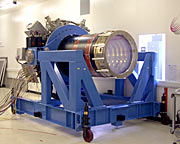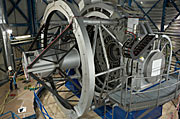Press Release
Big Red Eye is Ready
VISTA Camera Shipped to Paranal
17 January 2007
The world's biggest infrared camera for Europe's newest telescope left the UK today for Chile. The 67 million pixel camera will equip VISTA - a UK provided survey telescope being constructed in Chile for ESO. VISTA will map the infrared sky faster than any previous telescope, studying areas of the Universe that are hard to see in the visible due to either their cool temperature, surrounding dust or high redshift.
The 2.9-tonne VISTA camera has been designed and built by a consortium including the CCLRC Rutherford Appleton Laboratory, the UK Astronomy Technology Centre (UK ATC) in Edinburgh and the University of Durham.
"The camera operates under vacuum at a temperature of -200 degrees Celsius, so in many ways it has been like designing an instrument for use in space, but with the additional constraint of having to survive an earthquake environment," said Kim Ward, the Camera Manager from the Rutherford Appleton Laboratory, who oversaw the technical challenges. "With a total of 67 million pixels, VISTA has a much larger number of infrared sensitive detectors than previous infrared instruments."
VISTA is due to start scientific operations in the last quarter of 2007. "VISTA will be able to take images of sky areas each about 3 times as large as the full Moon," said Jim Emerson of Queen Mary, University of London, UK and VISTA's Principal Investigator. "This means it can survey quickly. The camera is crucial to carrying out VISTA's surveys which will provide statistical samples of objects and at the same time locate and characterise rare and variable objects, and perhaps most tantalisingly make discoveries of the as-yet unknown."
The 4-m VISTA will survey large areas of the southern sky at near-infrared wavelengths to study objects that are not seen easily in optical light either because they are too cool, or are surrounded by dust (which infrared light penetrates much better than optical), or whose optical light is redshifted into the near-infrared by the expansion of the Universe. Amongst other things VISTA's surveys will help our understanding of the nature, distribution, and origin of known types of stars and galaxies, map the 3-D structure of our galaxy, and help determine the relation between the 3-D structure of the universe and the mysterious 'dark energy' and 'dark matter'. Samples of objects will be followed up in detail with further observations by other telescopes, in particular, ESO's Very Large Telescope (VLT).
"VISTA is an eagerly awaited addition to ESO's suite of telescopes," commented Catherine Cesarsky, ESO's Director General. "Wide area surveys in the infrared such as those which VISTA will undertake can drive discoveries across the field of astronomy."
"The unique Paranal site, the large 4-m telescope aperture, the wide field, and the high efficiency of the detectors will make VISTA the world's outstanding ground based near-IR survey instrument," said Richard Wade from PPARC and President of the ESO Council.
VISTA (the Visible and Infrared Survey Telescope for Astronomy) is a 55 million euro project, funded by grants from the UK DTI's Joint Infrastructure Fund and the Particle Physics and Astronomy Research Council (PPARC) to Queen Mary, University of London, the lead institute of the VISTA Consortium. VISTA forms part of the UK's subscription to ESO and will be an ESO telescope. VISTA is project managed by PPARC's UK Astronomy Technology Centre. The VISTA web page is at http://www.vista.ac.uk.
Contacts
Kim Ward
UKATC
Edinburgh, UK
Tel: +44 (0) 1235 445237
Email: k.ward@rl.ac.uk
Jim Emerson
Queen Mary University of London
London, UK
Tel: +44 (0) 1794 127 1548
Email: j.p.emerson@qmul.ac.uk
About the Release
| Release No.: | eso0704 |
| Legacy ID: | PR 04/07 |
| Name: | VIRCAM, Visible and Infrared Survey Telescope for Astronomy |
| Type: | Unspecified : Technology : Observatory : Instrument |
| Facility: | Visible and Infrared Survey Telescope for Astronomy |
Our use of Cookies
We use cookies that are essential for accessing our websites and using our services. We also use cookies to analyse, measure and improve our websites’ performance, to enable content sharing via social media and to display media content hosted on third-party platforms.
ESO Cookies Policy
The European Organisation for Astronomical Research in the Southern Hemisphere (ESO) is the pre-eminent intergovernmental science and technology organisation in astronomy. It carries out an ambitious programme focused on the design, construction and operation of powerful ground-based observing facilities for astronomy.
This Cookies Policy is intended to provide clarity by outlining the cookies used on the ESO public websites, their functions, the options you have for controlling them, and the ways you can contact us for additional details.
What are cookies?
Cookies are small pieces of data stored on your device by websites you visit. They serve various purposes, such as remembering login credentials and preferences and enhance your browsing experience.
Categories of cookies we use
Essential cookies (always active): These cookies are strictly necessary for the proper functioning of our website. Without these cookies, the website cannot operate correctly, and certain services, such as logging in or accessing secure areas, may not be available; because they are essential for the website’s operation, they cannot be disabled.
Functional Cookies: These cookies enhance your browsing experience by enabling additional features and personalization, such as remembering your preferences and settings. While not strictly necessary for the website to function, they improve usability and convenience; these cookies are only placed if you provide your consent.
Analytics cookies: These cookies collect information about how visitors interact with our website, such as which pages are visited most often and how users navigate the site. This data helps us improve website performance, optimize content, and enhance the user experience; these cookies are only placed if you provide your consent. We use the following analytics cookies.
Matomo Cookies:
This website uses Matomo (formerly Piwik), an open source software which enables the statistical analysis of website visits. Matomo uses cookies (text files) which are saved on your computer and which allow us to analyze how you use our website. The website user information generated by the cookies will only be saved on the servers of our IT Department. We use this information to analyze www.eso.org visits and to prepare reports on website activities. These data will not be disclosed to third parties.
On behalf of ESO, Matomo will use this information for the purpose of evaluating your use of the website, compiling reports on website activity and providing other services relating to website activity and internet usage.
Matomo cookies settings:
Additional Third-party cookies on ESO websites: some of our pages display content from external providers, e.g. YouTube.
Such third-party services are outside of ESO control and may, at any time, change their terms of service, use of cookies, etc.
YouTube: Some videos on the ESO website are embedded from ESO’s official YouTube channel. We have enabled YouTube’s privacy-enhanced mode, meaning that no cookies are set unless the user actively clicks on the video to play it. Additionally, in this mode, YouTube does not store any personally identifiable cookie data for embedded video playbacks. For more details, please refer to YouTube’s embedding videos information page.
Cookies can also be classified based on the following elements.
Regarding the domain, there are:
- First-party cookies, set by the website you are currently visiting. They are stored by the same domain that you are browsing and are used to enhance your experience on that site;
- Third-party cookies, set by a domain other than the one you are currently visiting.
As for their duration, cookies can be:
- Browser-session cookies, which are deleted when the user closes the browser;
- Stored cookies, which stay on the user's device for a predetermined period of time.
How to manage cookies
Cookie settings: You can modify your cookie choices for the ESO webpages at any time by clicking on the link Cookie settings at the bottom of any page.
In your browser: If you wish to delete cookies or instruct your browser to delete or block cookies by default, please visit the help pages of your browser:
Please be aware that if you delete or decline cookies, certain functionalities of our website may be not be available and your browsing experience may be affected.
You can set most browsers to prevent any cookies being placed on your device, but you may then have to manually adjust some preferences every time you visit a site/page. And some services and functionalities may not work properly at all (e.g. profile logging-in, shop check out).
Updates to the ESO Cookies Policy
The ESO Cookies Policy may be subject to future updates, which will be made available on this page.
Additional information
For any queries related to cookies, please contact: pdprATesoDOTorg.
As ESO public webpages are managed by our Department of Communication, your questions will be dealt with the support of the said Department.




